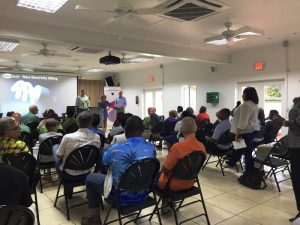THE BOTTOM – Roughly 20 per cent of electricity consumers on Saba will see an increase on their electrical bill per July 1, as a result of an increase in tariffs.
In a town hall meeting Tuesday night, the Authority for Consumers and Markets (ACM) and the Saba Electric Company explained the new tariff structure. In this new billing system there will be a fixed distribution tariff per month, which will cover the fixed cost of Saba Electric Company (SEC); production costs and the net losses.
Rates will be determined by the size of a connection, which depends on the size of the necessary fuse. According to SEC, 80 percent of the population use 7.7 kilovolt-amp (Kva). For consumers in this category, as a result of the distribution cost being partially subsidized by the Dutch government, they will not feel an increase. However the commercial sector will endure the most cost adjustments. There is no subsidy available for this group.
Subsidy not definite
The ACM representatives informed that it was seeking a solution before July 1 for particularly the 20 percent of consumers who will require higher Kva. ACM will attempt to make the consequential costs less burdensome for consumers in this group. This is why ACM has not set the maximum tariff.

Tuesday night’s town hall meeting where the new tariff structure was explained. Photo: Hazel Durand
On the flip side according to ACM Representative Marga Buys, every year the Dutch government will decide on the subsidy amount and every year the tariffs will change. Residents in attendance of the town hall meeting expressed their concern for this strategy. Residents may become comfortable paying a fixed rate, but in year this rate could increase.
Solutions
Within the next two weeks consumers will know which group they fall in. If a consumer is not in agreement with SEC’s recommended package they can request a test be done to determine if they can qualify for a downgrade, however a small fee will be charged for this.
Moreover Buys noted that the variable tariff will decrease when the solar panel parks are completed and functioning. At the moment one solar panel park is under construction. This project is being funded by the Dutch government.



